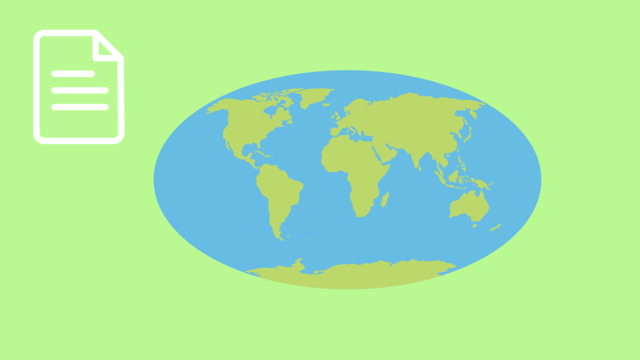Water Is Everywhere

Basics on the topic Water Is Everywhere
Uma heard that the earth is also called "the blue planet". Do you know why? The earth is called the blue planet because water is everywhere! Water really is everywhere, that's not an exaggeration. You can find out more about water and where you can find it in this video!
Transcript Water Is Everywhere
Uma heard that the earth is also called "the blue planet." But there are GREEN plants as far as her eyes can see. The earth is called the blue planet because "water is everywhere!" Water really is everywhere, that's not an exaggeration. Plants and animals, including humans, are made mostly of water. Humans, for example, are almost seventy percent water, and some plants are almost ninety percent! This explains why we need to drink so much WATER during the day. We have to keep our own water source full! We NEED water for life on earth. The water we drink is called FRESH water. The water in the ocean is called SALT water.
There is A LOT of water on earth. Most of the earth's surface is covered with water. Only a small part is the LAND on which we live. On land, the amount of fresh water is not the same everywhere. In places with very little fresh water there are deserts where few plants and animals live. Other places have more than enough water with lots of plants and animals. But, an incredible number of creatures live in the salt water of the oceans. These living creatures in the seas and oceans do not need FRESH water, but SALT water. Here you can see teeny tiny creatures, called marine plankton, floating in the water. In addition, there are animals like the shore crab, which live in colder salt water. Corals, sea anemones and many different fish live in warmer salt waters, like here on the Great Barrier Reef in Australia. There are so many creatures that need the salt water of the seas. Water not only makes life possible, but also shapes the land around us! Water moving through rivers can create valleys, water frozen in glaciers moves masses of earth, and water causes rocks to crumble into sand over millions of years. Water is not only found on earth in the LIQUID and SOLID state, but also in a GASEOUS state called water vapour. Water vapour is invisible and is in the air, we call the amount of water vapour in the air, humidity. It can also be measured.
We also use water in our everyday lives. We wash our bodies and things like cars or dishes with it. We move very large amounts of things all over the world on boats using rivers, canals and oceans. We even use water for fun by swimming and diving, or sitting on the beach and relaxing. Unfortunately though, we humans make a lot of waste and pollute the water. The smallest pieces of plastic and other waste float in the oceans of this world. And that's why more and more people are thinking about how we can clean our water and AVOID new rubbish so that our BLUE planet remains an oasis in space. Oooh, what is Uma looking at right now? It's a picture of our planet called Earth Rise and was taken by an Austronaut from the moon. Now Uma understands why the Earth is also called "the blue planet"!
Water Is Everywhere exercise
-
Why is Earth called 'The Blue Planet'?
HintsLook at this map of the Earth. The light blue is water and the light green is land.
Earth is mostly made of water.
SolutionEarth is called 'The Blue Planet' because water is everywhere! Our planet, along with the plants and animals that live on it, are all mostly made of water.
-
Locate the living creatures in the ocean habitat.
HintsDon't just look for animals. Remember, plants are living things too!
You should be able to find seven types of living creatures (both plants and animals) that depend on the salt water for life.
SolutionAs you can see, there are so many living creatures that need the salt water in the oceans and seas to survive!
Can you think of any other living things that can be found in the salt water?
-
Describe how plants and animals are made of water.
HintsMany living things on Earth are made mostly of water, such as plants, animals and humans.
Which has more water making up a percentage of its body: the child or the plant?
Solution- Plants and animals, including humans, are mostly made of water.
- Human children are almost 70% water.
- Some plants are almost 90% water.
-
Categorise how water should and should not be used.
HintsWhen water is polluted, it has rubbish such as plastic and glass in it. This water would not be good for living creatures to use!
Humans drink water, but we also use it in many other ways. Do you see 3 positive ways humans use water in the pictures?
SolutionThere are many good ways that humans use water, such as:
- Bathing and washing dishes.
- Moving things on large boats all around the world.
- Swimming and relaxing on lakes, rivers and oceans.
-
Why do we need water?
HintsAll plants and animals need water to survive.
Humans need to drink water every day to stay alive and healthy.
SolutionWater is very important because we need it for life on Earth.
Without water, living creatures such as plants, animals and humans could not exist.
-
Explain how water helps to shape the land on Earth.
HintsLook at the water crashing on the beach. Many years ago, there were more rocks and less sand. How do you think all of that sand got there?
Over time, as the river flows, it carves out this shape in the land with two steep sides.
Glaciers are frozen ice water. As they move, they break rocks and move land.
Water erosion also happens below the ground! Caves are formed by water flowing in the same underground space over a long period of time.
SolutionWater is a powerful resource on Earth that actually shapes the land. Here are four examples:
- Water that moves through rivers creates valleys.
- Water frozen in glaciers moves masses of Earth.
- Water in the ocean turns rocks into sand over millions of years.
- Water moving through the same underground space forms caves over a long period of time.


 Do you want to learn faster and more easily?
Do you want to learn faster and more easily?













